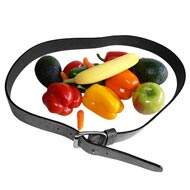Natural Foods That Burn Body Fat
Fat burning foods are also known as catabolic foods. Catabolic foods provide fewer calories while the body spends extra calories to process the food (metabolize). A simple example would be the intake of apples. An apple adds 85 calories to your body but the body has to spend 99 calories to process the food and derive energy for our body.
Logically therefore we burn more calories than we eat. This conclusion makes eating catabolic foods a good proposition especially among those wanting to lose weight. Burning fat by eating right surely appears to be an easy way as compared to slogging it out on the treadmill.
Catabolic foods that burn more calories than they provide include vegetables such as spinach, carrots, Brussels sprouts, zucchini, broccoli, asparagus, sweet potato, celery, parsley, eggplant, cooked leeks, lettuce, artichokes and tomato. Fruits that help burn calories are limes, pineapple, oranges, lemons, watermelon, strawberries, grapefruits, blueberries, blackberries, cantaloupe, plums and pears. Other vegetables and fruits that help burn calories are vegetables such as beans, cauliflower, cabbage, corn, onion, garlic, pumpkin, peas, beetroot and turnips. Calorie burning fruits include apples, cherries, peaches, apricots, grapes and tangerines. Sea foods also help reduce calories. Lobsters, crabs, shrimps, clams and tuna are ideal calorie burning sea foods. White meat without fat can also help burn calories. Eggs and specifically egg yolks are high in protein and fiber and require more calories to digest. High protein foods are also recommended dietary items to burn calories faster. Milk, yoghurt and cheese are high calcium foods that help burn fat faster. Whole grains are ideal carbohydrate replenishing foods that add fewer calories while white rice, white bread and pasta are sources of processed carbohydrates that are best avoided.
It is advisable to choose among a wide variety of foods to comprise a minimum of ten servings a day. Sticking to any one type of vegetable or fruit over a long period of time can cause nutritional deficiencies instead of weight loss. The body requires calcium, protein, fats and carbohydrates to derive energy that helps the body function effectively. Different types of fruits, vegetables, sea food and meat help us derive vitamins and minerals essential for the well being of our body. Do not restrict your regular diet pattern by shifting completely to fat burning foods. But wisely include such foods on a regular basis to help maintain desired weight. It is also important to supplement your diet program with a moderate exercise regime.
Read more articles from the Diet for diseases Category.

 Find Pose
Find Pose

